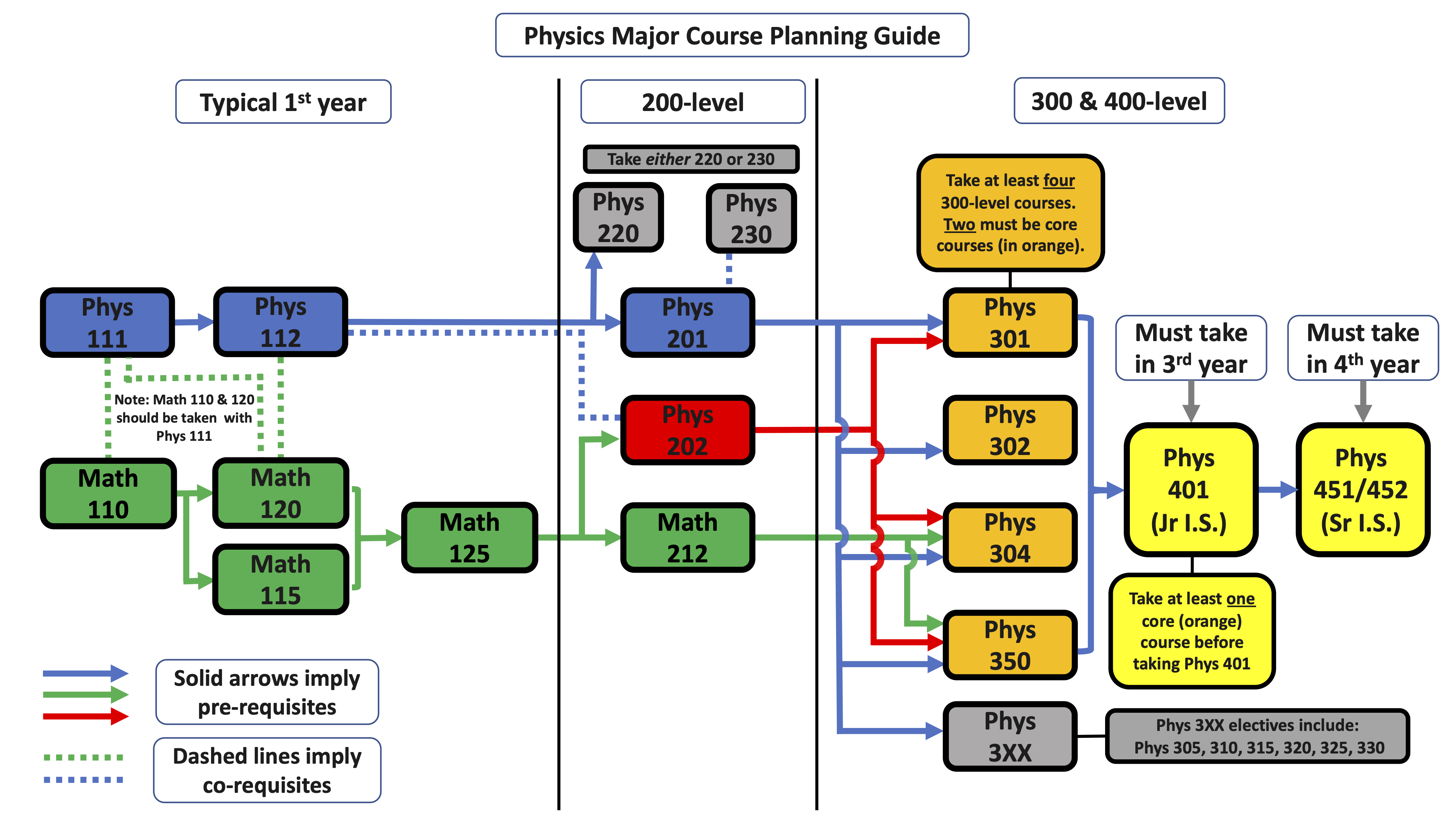A Physics major provides a rigorous grounding in the scientific process and a firm scientific understanding of the world. It fosters critical thinking and provides broad practical training in science and technology. It can lead to graduate study and basic research (in a variety of disciplines), to stimulating jobs in industry, or to challenging and rewarding careers in teaching. Our faculty is engaged in original research, and our students are drawn early into collaborative research projects with faculty.

Formally, the Physics major requires 15 courses:
The pre-requisites for the required courses are included in square brackets after each course name.
- MATH 11000 – Applied Differential Calculus (half-semester course)
- MATH 12000 – Applied Integral Calculus (half-semester course) [MATH 110]
- MATH 11500 – Theory of Differential Calculus (half-semester course) [MATH 110]
- MATH 12500 – Theory of Integral Calculus (half-semester course) [MATH 115 + MATH 120]
- MATH 21200 – Multivariate Calculus [MATH 125]
- PHYS 11100 – Physics for the Physical Sciences I
- PHYS 11200 – Physics for the Physical Sciences II [PHYS 111]
- PHYS 20100 – Modern Physics [PHYS 112]
- PHYS 20200 – Mathematical Methods for the Physical Sciences [MATH 125 + PHYS 112]
- One of the following:
- PHYS 22000 – Electronics for Scientists + Lab [PHYS 108 or PHYS 112]
- PHYS 23000 – Computational Physics [PHYS 201]
- Two of the following:
- PHYS 30100 – Classical Mechanics [PHYS-201 and PHYS-202]
- PHYS 30200 – Thermal Physics [PHYS 201]
- PHYS 30400 – Electricity and Magnetism [PHYS 201 and PHYS 202 and MATH 212]
- PHYS 35000 – Quantum Mechanics [PHYS 201 and PHYS 202 and MATH 212]
- Two semesters of PHYS 3xx – Advances Physics course [PHYS 201]
- The Junior and Senior Independent Study sequence
- PHYS 40100 – Independent Study [PHYS 201 AND one of PHYS 301, 302, 304, 350]
- PHYS 45100 – Independent Study Thesis [PHYS 401]
- PHYS 45200 – Independent Study Thesis [PHYS 451]
Information can also be found on the official course catalogue website for Physics major and Physics minor.
Physics majors planning to get a minor in mathematics need to take an additional math course beyond the six otherwise required for the math minor. College-wide policy requires that at least four courses for the minor do not count toward any other major or minor. Because the half-semester courses MATH 110 + 115 + 120 + 125, and the full-semester course MATH 212 are required for the physics major, students need to take four additional math courses in order to minor in math.

Special Notes
- The Physics for the Physical Sciences sequence PHYS 11100, PHYS 11200 is a prerequisite for the selection of Physics as a major and is best taken the first year, although one can still complete the major if the sequence is taken the second year.
- The Calculus Math sequence (four half-semester courses) MATH 11000, MATH 11500, MATH 12000, and MATH 12500 must be taken at least concurrently with the Physics for the Physical Sciences sequence.
- Those students considering graduate study in physics should be sure to take all four core curriculum courses (PHYS 30100, PHYS 30200, PHYS 30400, and PHYS 35000). In addition, we suggest these students take MATH 21100, CHEM 11100, CHEM 11200, and as many advanced Physics courses as can be scheduled.
- Those students considering astronomy or astrophysics as a career should major in Physics and take PHYS 10400, PHYS 10500, and PHYS 32000.
- For students interested in engineering, Physics is a natural basis for 3-2 engineering programs, which are described under Pre-Professional and Dual Degree Programs.
- Students in a 3-2 program must complete at least two 300-level courses (at least one of which must be PHYS 30100, PHYS 30200, PHYS 30400, or PHYS 35000) and PHYS 40100 by the end of the Junior year.
- PHYS 10300, PHYS 10400, PHYS 10500, PHYS 10600, PHYS 10700, and PHYS 10800 do not count toward a Physics major.
- No student may receive credit for both PHYS 10700 and PHYS 11100, or for both PHYS 10800 and PHYS 11200.
- Advanced Placement: A student may receive credit if a score of 4 or 5 is obtained on any of the following AP examinations:
- Physics 1
- Physics 2
- Physics C: Mechanics
- Physics C: Electricity and Magnetism
- Students need to check with the chairperson of the department to determine whether they will receive one or two credits toward graduation and at what level they should begin their college Physics courses. The advanced placement policy of the College is explained in the section on Admission. Students who have taken a college level physics course (other than Advanced Level or AP Exam) and would like to place beyond the first Physics course need to take a placement exam that the chairperson administers.
- The laboratory and classroom components are closely integrated in Physics courses with a laboratory and must therefore be taken concurrently. The course grade and the laboratory grade will be identical and are based on performance in both components; the relative weight of the two components will be stated in each course syllabus.
- Physics majors cannot use S/NC grading option for the required courses, and the department recommends they not use it for any course in Physics, Mathematics, or Chemistry.
- Physics minors can use the S/NC grading option for no more than two of the required courses.
- Only grades of C- or better are accepted.
- Only grades of C- or better are accepted as a prerequisite for 200-level courses and above.
Double majors with Physics may elect to complete their I.S. in their other department and not complete 45100 and 45200 in Physics. If this option is selected, students are required to complete one additional 300-level elective in Physics.
